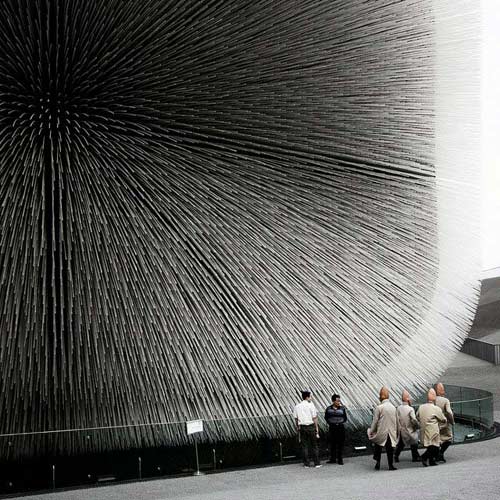asia
asia, elements, horror, science | March 11th, 2011 5:15 pm

Shanghai is to extend the one-child policy to man’s best friend after tens of thousands of people complained of being bitten last year – and to prevent dog mess spoiling the country’s showcase business city.
The rule has already been imposed in several other Chinese cities, but Shanghai’s size – it has a population of more than 20 million – has made the presence of thousands of dogs more problematic. Dogs bigger than 3ft will be banned from the centre of the city and so-called “attack dogs”, including bulldogs, will be banned completely.
The ruling is the latest instance of uneasy relationships between man’s best friend and the Chinese authorities. During the Communist era of Mao Zedong, pets were frowned upon as a middle-class affectation and government opponents were condemned as capitalist running dogs. But China’s growing openness, combined with its rising affluence, means that pets are making a comeback, and there are around 100 million pet dogs in China. However, from May, a one-dog policy will be introduced in Shanghai and more than 600,000 unlicensed dogs will be declared illegal – and killed because of fears of rabies.
{ The Independent | Continue reading }
photo { Alvaro Sanchez-Montañes }
related { The special bond that often forms between people and both domesticated and wild animals may be, paradoxically, part of what makes us human. | Seed | full story }
asia, dogs, law | February 26th, 2011 7:18 pm

…50-year-old Nobuhiro Komiya who for the last two years has worked tirelessly doing one of the most unlikely and mind boggling of jobs - censoring the unending torrent of hentai manga or pornographic comics which flood Tokyo’s book shops and convenience stores.
“It’s a tough job. (…) It’s totally different to reading manga as a hobby,” he says.
A visit to the Department of Youth Affairs and Public Safety on the 35th floor of Tokyo’s towering Metropolitan Government building, where Komiya and his small team of censors get down to the grisly task of comic book censorship, reveals we are talking about a lot more than the width of Wonder Woman’s bust.
Spread out over the white Formica table-top are the worst of the worst - a hand-picked selection of the weirdest and most shocking examples of hentai from the country which invented it.
“Normal sex doesn’t sell well,” Komiya remarks. School sex, tied-up sex, abnormal sex, sells. So this is what they draw.”
{ NZ Herald | Continue reading }
photo { Asha Schechter }
asia, law, sex-oriented, visual design | February 14th, 2011 4:07 pm

According to a recent study commissioned by the Japanese government, the country’s desire for sex is dropping quickly.
The biennial survey, originally designed to gauge the success of the country’s birth-control education, revealed that 36.1 percent of Japanese males between 16 and 19 had no interest in or even loathed sex. In 2008, that number was 17.5 percent.
Of girls in that 16–19 age group, 59 percent had no interest in sex, up 12 points from 2008.
Forty percent of married people admitted to not having sex within the last month.
Overall, the fertility rate in Japan has dropped to 1.37 births per woman. It’s 2.06 in the U.S. Such a low rate, if it continues, could have major consequences for the Japanese economy.
{ Good Feed | Continue reading }
image { Amazon.com }
asia, economics, relationships, sex-oriented | February 9th, 2011 5:06 pm

The Soviet and Japanese threats to American supremacy proved chimerical. (…) The Chinese challenge to the United States is more serious for both economic and demographic reasons. The Soviet Union collapsed because its economic system was highly inefficient, a fatal flaw that was disguised for a long time because the USSR never attempted to compete on world markets. China, by contrast, has proved its economic prowess on the global stage. Its economy has been growing at 9 to 10 percent a year, on average, for roughly three decades. It is now the world’s leading exporter and its biggest manufacturer, and it is sitting on more than $2.5 trillion of foreign reserves. Chinese goods compete all over the world. This is no Soviet-style economic basket case.
Japan, of course, also experienced many years of rapid economic growth and is still an export powerhouse. But it was never a plausible candidate to be No. 1. The Japanese population is less than half that of the United States, which means that the average Japanese person would have to be more than twice as rich as the average American before Japan’s economy surpassed America’s. That was never going to happen. By contrast, China’s population is more than four times that of the United States. The famous projection by Goldman Sachs that China’s economy will be bigger than that of the United States by 2027 was made before the 2008 economic crash. At the current pace, China could be No. 1 well before then.
{ Foreign Policy | Continue reading }
photo { Christopher Schreck }
U.S., asia, economics, within the world | January 10th, 2011 1:25 am

Gamers, as video-game players are known, thrill to “the pull,” that mysterious ability that good games have of making you want to play them, and keep playing them.
Miyamoto’s games are widely considered to be among the greatest. He has been called the father of modern video games. The best known, and most influential, is Super Mario Bros., which débuted a quarter of a century ago and, depending on your point of view, created an industry or resuscitated a comatose one. It spawned dozens of sequels and spinoffs. Miyamoto has designed or overseen the development of many other blockbusters, among them the Legend of Zelda series, Star Fox, and Pikmin. Their success, in both commercial and cultural terms, suggests that he has a peerless feel for the pull, that he is a master of play—of its components and poetics—in the way that Walt Disney, to whom he is often compared, was of sentiment and wonder. (…)
What he hasn’t created is a company in his own name, or a vast fortune to go along with it. He is a salaryman. Miyamoto’s business card says that he is the senior managing director and the general manager of the entertainment-analysis and -development division at Nintendo Company Ltd., the video-game giant. What it does not say is that he is Nintendo’s guiding spirit, its meal ticket, and its playful public face. Miyamoto has said that his main job at Nintendo is ningen kougaku—human engineering. He has been at the company since 1977 and has worked for no other.
{ The New Yorker | Continue reading }
asia, economics, experience, leisure, technology, visual design | December 13th, 2010 7:20 pm

Chinese netizens have already started selecting the Internet catchphrases of 2010. (…)
Geili Geili used to be a word only spoken in the northern dialect literally meaning “giving power,” but is now widely accepted as an adjective describing something “cool,” “awesome,” or “exciting.” Its antonym “bugeili” means “far from desirable,” “dull” or “boring.”
Magic horse is just floating cloud. “Magic horse” actually does not refer to a horse, but is rather a homophone of “shen me” meaning “what.” “Magic horse” replaced its predecessor “xia mi” as the most popular phrase in the Chinese Internet community shortly after its emergence. “Floating cloud” here indicates “purely imaginary” or “disappearing quickly.” Altogether, the phrase means “nothing is worth mentioning.”
{ People Daily | Continue reading }
Linguistics, asia, horse | December 2nd, 2010 8:00 pm

In an interesting display of Greco-Turkish friendship, visitors from the Greek mainland joined with locals in the coastal Aegean village of Yagcilar as they gathered to watch bulldozers and men with shovels move in on the former home of a Greek Orthodox priest.
Under normal circumstances the demolition of a holy man’s home and the excavation of his garden would have prompted political commentary, but in this case the events had been arranged collaboratively by the current Turkish landowners, the great grandchildren of the exiled priest, the Ministry for Culture and Antiquities, and the governor of the district of Urla.
The aim of the excavators was to uncover 400 kilograms of gold and money buried in the garden in the mid-1920s for safekeeping. It had been entrusted to the priest by his religious community as they found themselves forced to evacuate Greece in the exchange of population that took place at the time.
The tip on the whereabouts of the treasure came from a diary entry found by the priest’s descendents, in which he indicates that he hid the money on the grounds of his house. After three days of searching, nothing but dirt was unearthed, leaving the treasure hunters with suspicions that the priest may have protected the treasure with a special spell.
In desperation, Turks called in a well known local hoca, a local religious leader, to pray at the site. Eyyup Hoca directed the operation to new areas to in which to dig and, with the second excavation attempt coming out empty-handed, he announced that jinn (fairies or imps) had changed the hiding place of the money every 41 years since the date of its burial. This was accepted as a reasonable explanation, and the quest continues.
The concept and existence of jinn is widely accepted in Islam. God is said to have created the jinn before humans from “hot wind” and “smokeless fire”, and some jinn are Muslim. Like humans they were invested with intellect, discrimination, freedom and the power to choose between right and wrong. They live all over earth on a separate plane of existence from man and cannot easily be seen, though they are often thought to take the shape of snakes and black dogs.
It is believed that some areas are particularly attractive to jinn - deserts, ruins and places of impurities such as dunghills, bathrooms and graveyards - but jinn can quite easily live alongside humans in their homes.
{ Asia Times | Continue reading }
asia, mystery and paranormal, weirdos | November 24th, 2010 5:15 pm

Taliban Leader in Peace Talks Was an Impostor
For months, the secret talks unfolding between Taliban and Afghan leaders to end the war appeared to be showing promise, if only because of the appearance of a certain insurgent leader at one end of the table: Mullah Akhtar Muhammad Mansour, one of the most senior commanders in the Taliban movement.
But now, it turns out, Mr. Mansour was apparently not Mr. Mansour at all. In an episode that could have been lifted from a spy novel, United States and Afghan officials now say the Afghan man was an impostor, and high-level discussions conducted with the assistance of NATO appear to have achieved little.
“It’s not him,” said a Western diplomat in Kabul intimately involved in the discussions. “And we gave him a lot of money.”
{ NY Times | Continue reading }
photo { Jacques-André Boiffard, 1930 }
U.S., asia, haha, scams and heists | November 23rd, 2010 2:24 pm

China may not matter quite as much as you think
It is hard to exaggerate the Chinese economy’s far-reaching impact on the world, from small towns to big markets. It accounted for about 46% of global coal consumption in 2009, according to the World Coal Institute, an industry body, and consumes a similar share of the world’s zinc and aluminium. In 2009 it got through twice as much crude steel as the European Union, America and Japan combined. It bought more cars than America last year and this year looks set to buy more mobile phones than the rest of the world put together, according to China First Capital, an investment bank.
In China growth of 9.6% (recorded in the year to the third quarter) represents a slowdown. China will account for almost a fifth of world growth this year, according to the IMF; at purchasing-power parity, it will account for just over a quarter. (…)
Since the crisis, China has shown that its economy can grow even when America’s shrinks. It is not entirely dependent on the world’s biggest economy. But that does not mean it can substitute for it.
{ The Economist | Continue reading }
photo { Thomas Prior }
asia, economics | November 4th, 2010 2:35 pm
asia, gross, haha, video, weirdos | November 4th, 2010 2:22 pm

Something has been bothering me lately and it is our assumption that China is the world’s next superpower and that we’d darned well better get used to it. Hogwash. We’re into the Chinese decade, not the Chinese Century.
The century belongs to India. (…)
China has the population, the will, the educational system, the foreign currency reserves — everything to make it the next global superpower except two things: 1) an emerging middle class generation comparable to our Baby Boomers, and; 2) a functional diaspora (look it up, I’ll wait).
In contrast to China, India has only those two things: 1) a real Baby Boomer class, and; 2) a functional diaspora (did you look it up?). Nothing else about India works at all — nothing. India is corrupt and divided. While India has a commercial tradition it isn’t an especially functional one. Fractionalism and factionalism, whether economic, social, or religious, will keep India from ever truly pulling together. But that doesn’t matter because my two original points are enough.
{ Robert X. Cringely | Continue reading }
map { Delhi (Modern City), 1914 | enlarge | more }
asia, economics | November 1st, 2010 4:15 pm

Like a Middle Eastern version of Las Vegas, Dubai’s biggest challenge is water, which may be everywhere in the gulf but is undrinkable without desalination plants. These produce emissions of carbon dioxide that have helped give Dubai and the other United Arab Emirates one of the world’s largest carbon footprints. They also generate enormous amounts of heated sludge, which is pumped back into the sea.
The emirates desalinate the equivalent of four billion bottles of water a day. But their backups are thin: at any given time, the region has, on average, an estimated four-day supply of fresh water.
{ NY Times | Continue reading }
photo { Nicholas Haggard }
asia, uh oh, water, within the world | October 28th, 2010 8:17 am

How much do you confide in friends?
In the United States, friends often share intimate details of their lives and problems, but in Japan this degree of self-disclosure between friends is much less common. A new study published in Psychological Science by an American researcher living in Japan suggests that this difference may be due to distinct social systems, in particular the extent to which there are opportunities to make new friends in each culture.
{ APS | Continue reading }
U.S., asia, psychology, relationships | October 25th, 2010 1:40 pm

In thinking about Afghanistan, it is essential that we begin by thinking about the nature of guerrilla warfare against an occupying force. The guerrilla lives in the country. He isn’t going anywhere else, as he has nowhere to go. By contrast, the foreigner has a place to which he can return. This is the core weakness of the occupier and the strength of the guerrilla. The former can leave and in all likelihood, his nation will survive. The guerrilla can’t. And having alternatives undermines the foreigner’s will to fight regardless of the importance of the war to him.
The strategy of the guerrilla is to make the option to withdraw more attractive. In order to do this, his strategic goal is simply to survive and fight on whatever level he can. His patience is built into who he is and what he is fighting for. The occupier’s patience is calculated against the cost of the occupation and its opportunity costs, thus, while troops are committed in this country, what is happening elsewhere?
Tactically, the guerrilla survives by being elusive. He disperses in small groups. He operates in hostile terrain. He denies the enemy intelligence on his location and capabilities. He forms political alliances with civilians who provide him supplies and intelligence on the occupation forces and misleads the occupiers about his own location. The guerrilla uses this intelligence network to decline combat on the enemy’s terms and to strike the enemy when he is least prepared. The guerrilla’s goal is not to seize and hold ground but to survive, evade and strike, imposing casualties on the occupier. Above all, the guerrilla must never form a center of gravity that, if struck, would lead to his defeat. He thus actively avoids anything that could be construed as a decisive contact. (…)
The asymmetry of this warfare favors the guerrilla. This is particularly true when the strategic value of the war to the occupier is ambiguous, where the occupier does not possess sufficient force and patience to systematically overwhelm the guerrillas, and where either political or military constraints prevent operations against sanctuaries.
{ George Friedman | Continue reading }
related { Has the West declared cyber war on Iran? Experts say the computer virus found in a nuclear plant is the work of a foreign power. }
U.S., asia, fights, ideas | October 1st, 2010 4:21 pm

Singapore math is taking hold in schools throughout the country. Here in New York City, home to the nation’s largest school system, a small but growing number of schools have adopted this approach, based on Singapore’s national math system.
Many teachers and parents here say Singapore math helps children develop a deeper understanding of numbers and math concepts than they gain through other math programs.
{ NY Times | Continue reading }
artwork { Jasper Johns, 0 through 9, 1960 }
asia, kids, mathematics, new york | October 1st, 2010 4:10 pm
asia, visual design | September 29th, 2010 8:14 am
asia | September 27th, 2010 12:00 pm
animals, asia, dogs | June 26th, 2010 8:53 am
U.S., asia, pipeline | June 16th, 2010 5:54 pm






















